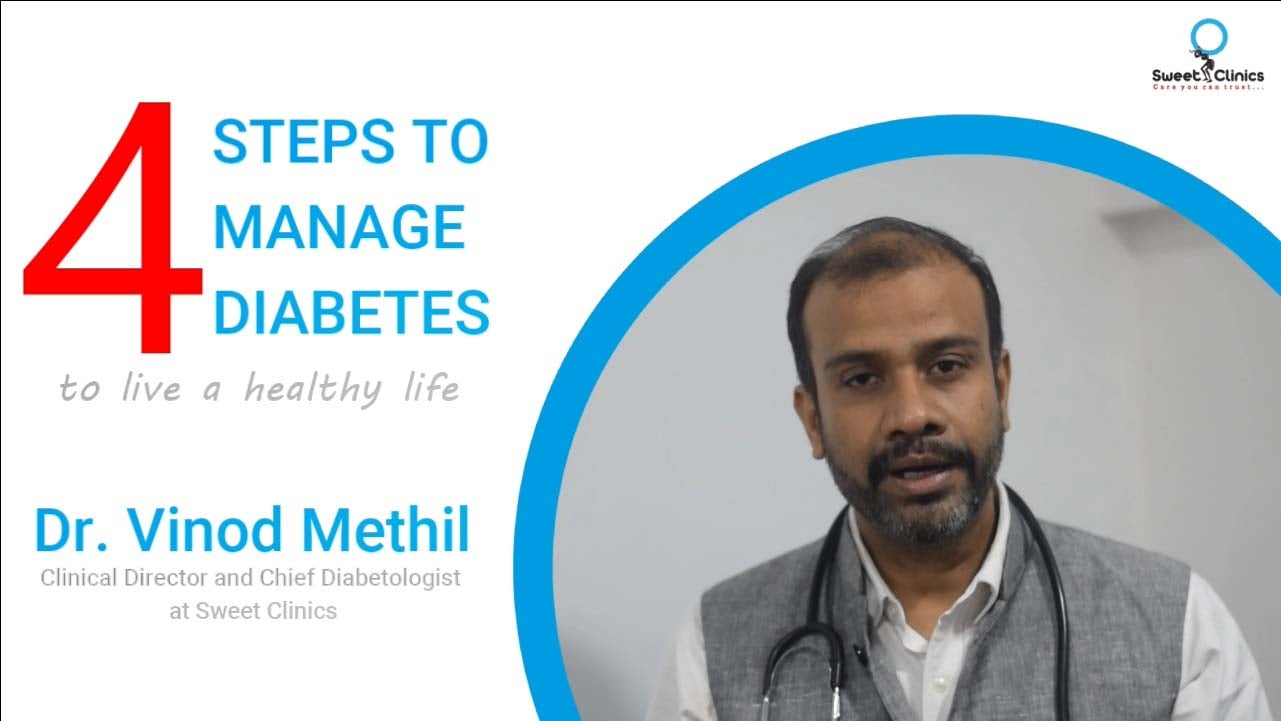
Health Tips for Elderly and Diabetic Patients During COVID-19
COVID-19 has affected the lives of millions of people around the world. It seems like everyone who goes out often is at risk of catching the virus. However, senior citizens or people above 55 years old need special care. They need to follow the COVID-19 precautions to stay healthy and safe during these tough times. The infection can affect people’s health in a different way. Some people suffer from unnoticeable symptoms and recover quickly, while others end up with respiratory complications. Experts believe that people suffering from diabetes, respiratory issues, and other serious medical conditions are at high risk of COVID-19 infection.
People with type 2 diabetes have a weak immune system. It is important for these patients to find a board-certified diabetologist in Navi Mumbai. You need to eat a diet that keeps your sugar levels under control. In this post, we will walk you through a few home remedies and easy health for diabetic patients during the pandemic.
Stick to a Healthy Routine
Diabetic patients, especially those above 55 years, need special care during the pandemic. Know that the immune system of a person suffering from diabetes isn’t as strong as the immune system of a healthy person. Take your medicines on time and make sure you follow a healthy and balanced diet. Eat foods that can improve your immunity and control the glucose level. Diabetics must avoid junk food, fried food, packaged products, and other unhealthy snacks.
Monitor Your Glucose Level
High and blood low sugar levels are quite common in diabetic patients. The only way to enhance your immune system and improve metabolism is by keeping the sugar levels under control. Monitor your sugar levels regularly. If it’s too high or too low, consult a specialist that offers a diabetes care program in Navi Mumbai immediately. Consider virtual meetings to avoid the risk of COVID-19.
Take Your Medicines
While natural remedies work wonders, you can’t skip your medicines. A diabetologist recommends medicines considering your sugar levels. Make sure you have at least 1-2 month stock of your medicine. Order the prescribed drugs online and take them on time. Besides, you must stay in touch with the doctor. Diabetic patients can have health complications. Not only can it affect your immune system, but high sugar levels can affect your eyes and skin too.
If you notice changes in your vision, check your sugar levels and visit the diabetes eye care clinic in Navi Mumbai.
Be Careful of Wounds
It takes longer for a diabetic patient to recover from the wounds and cuts. That’s because the high sugar levels affect the ability of your system to heal wounds. Wounds take more time to heal and they can progress rapidly in people suffering from diabetes. Make sure you avoid anything that could lead to cuts. Consult a diabetic foot specialist in Vashi if you have a diabetic foot.
Visit: https://sweetclinics.com/

4 Steps To manage diabetes to lead a normal & healthy diabetic life.
Living with diabetes can be challenging but this should not prevent a diabetic from leading a normal life, as long as, they can keep their blood sugar under control. Today we would like to share our 4 step approach to help diabetics lead a normal life which Dr.Vinod Methils our chief diabetologist at our Vashi center advises his patients. Patients who have followed this approach have seen significant improvement in their lifestyle and we hope it can help you to.. so here we go
- Learn about Diabetes: Today there is a plethora of information available on each aspect of diabetes. One of key reason people turn up in our OPD with diabetic complication as they often tend to ignore early symptoms. They only reach the diabetologist once the complication become severe. Diabetic can manage themselves better by being aware of how diabetes can affect the body and what self-precautions one needs to take. Thereby, preventing unnecessary complications. After all Diabetes is called a Silent Killer for a reason. So go ahead use that internet for acquiring more knowledge about diabetes. If any doubts always feel free to send us an email and we will help resolve your doubt.
- Know the ABC of Diabetes:
- A – A1c levels (commonly known as HbA1c): The Glycated haemoglobin (HbA1C) test gives the average blood sugar levels for the past 3 months. As a general rule the HbA1c levels should be near or below 7. However, if HbA1c level is higher than 8. It indicates higher blood sugar and relatively higher chances of diabetic complications. These levels also help the diabetologist set targets to bring the blood sugar levels back within normal range.
- B – Blood Pressure: Diabetes is known to causes atherosclerosis, which results in blocking of the arteries. This often causes high blood pressure in diabetics. Hence, a high blood pressure would indicate that diabetes has started to affect the blood vessels. If the BP has been very high for a while, it would be an early warning sign for the diabetologist to initiate further testing to understand how much damage is done in the body. The blocking generally takes place where blood vessels are thinner in organs like eyes, kidney & heart walls etc. Hence, the diabetologist may suggest test to check functioning of these organs based on his examination. Hence, diabetics should periodically keep a check on their Blood Pressure levels. With the normal range bring 120/80 mmHg.
- C – Cholesterol – HDL & LDL levels: Diabetics in general have a high cholesterol level. There are 2 types of cholesterol HDL (High-density-lipoprotein cholesterol) a.k.a Good Cholesterol & LDL (Low-density-lipoprotein cholesterol) also known as bad cholesterol. LDL cholesterol is know to get deposited in the blood vessel leading cardio-vascular diseases. Being Diabetic accelerates the deposition increasing the risk CVD risk. Hence, by periodic testing of Cholesterol levels helps the diabetologist assess the risk and take corrective measures. Hence, knowing the ABC of diabetes helps a diabetic and the treating doctor understand the health profile and take necessary measures to keep diabetes & its complications in check
- Learn to live with diabetes: Having diabetes can make one anxious stressed and at times depressed. Nonetheless, one needs to understand that people can still live a healthy happy life even if their diabetes cannot be reversed. As stressing about the fact that one is diabetic only increase the Blood Pressure, which is not good to have as we discussed above. Hence, instead of fussing about it best for diabetics to consult their diabetologist like Dr. Vinod Methil who can suggest coping mechanism to the new way of life. Something diabetics can do are meditation, acquiring new hobbies etc.
- Testing & Follow-ups: Keeping up with the testing for blood sugar and the ABC levels discussed followed by timely diabetologist follow-up can help identify and mitigate any diabetic complications. Being proactive to understand and communicate to the treating doctor about any adverse symptoms is the best way move forward with diabetes treatment.
At Sweet Clinics, by advising the above stated 4 step method to live a diabetic life we have helped patients reverse their pre or early diabetes. While patients for whom diabetes cannot be reverse have been able to live with a normal diabetic life. So we you have any more queries please feel free to contact us and we will be happy to help.
References:
https://clinical.diabetesjournals.org/content/28/3/107https://www.diabetes.co.uk/Diabetes-and-cholesterol.html
https://care.diabetesjournals.org/content/27/suppl_1/s68

The Complete Guide to Diabetes eyecare
In this article we look at how diabetes affects the eye and what measure a diabetic can take to prevent diabetic retinopathy & other diabetes related eye problems.
So, let me begin by asking you a question. Do you know the number one cause of blindness in adults all over the world? And the answer for that is diabetes.
So let us look into how this happens, how diabetes actually effect your eyes. If there is anything you can do to prevent this complication from happening. So when we talk about diabetes we know it’s a medical condition where the blood sugar is consistently high or above normal. This blood is continuously splitting all over your body and over a period of time it starts effecting your organs. Basically, it can damage the blood vessels of your heart, it can damage the blood vessels of the kidney, can damage the blood vessels of brain and it can damage the blood vessels of the eye.
How does Diabetes affect the eye?
So what happens in the eye? So in the eye we have retina. Retina is the major part of the eye. Retina has the vast abundant vascular supply. Now in retina what happens is that this small blood vessels, they start getting blocked by the blood sugars. When these blood vessels start getting blocked: two things happen.
- First is that it starts leaking fluids and this fluid starts getting accumulated in the retina. When it gets accumulated in the macula which is the important part of retina where the main vision is developed you get a condition which is called macular Edina. So the macula starts get swelling up and the image then starts getting blurred and visual disturbance can happen. This used to be treated immediately before any permanent damage happens.
- Second thing that happen because of this is that some new blood vessels starts forming in the retina and the new blood vessels that form are very unstable and can start leaking of fluid or blood which can cause bleeding in the eye. This is very harmful and cause visual disturbance.
So these are the two major changes which happens and basically it is called diabetic retinopathy and this is divided into various stages. Initial stage of diabetic retinopathy is known as non-proliferative diabetic retinopathy. As the condition worsens, we get proliferative retinopathy. In the earlier stage you may not see any symptoms so you may ignore this problem. So it is very crucial to identify this case in early stage.
How to detect diabetic retinopathy or of eye damage due to diabetes early on?
So how can we diagnose diabetic retinopathy in the early stage. We can diagnose diabetic retinopathy by getting eyes checked by diabetologist or an eye surgeon. The diabetologist or eye specialist look into the eye or precisely retina for any changes that might happen in the retina. Consequently, they can detect these changes early.
Diabetic Retinopathy can happen in all forms of diabetic patients. It can happen in Type 1 diabetic patients. It can happen in Type 2 diabetic patients. It can also happen in pregnant woman having diabetes. By getting the test you can detect this early. So every diabetic patient should get their eye examined at least once in a year and then depending on the condition the eye specialist can recommend you other earlier check ups. So it is very crucial that you detect them early. Start early treat early.
Treatment for diabetic retinopathy or eye damage due to diabetes?
So there are various treatments available for this condition that happens in diabetic patients.
- There are injections that can make swelling go down
- There is laser treatment available
- Surgeries which is done when pulling or stretching the retina happens.
So the other thing that can happen in diabetic patient is cataract. The lens becomes cloudy and the other is glaucoma which can happen in diabetic patient. In general we know that the diabetes can barely effect your eyes so we need to be careful,we should be alert. We should be testing ourselves to prevent this complication. The best part is that this complication can be settled down if we detect this early.
Other eye conditions that can occur in Diabetic patients?
So coming to the end I would say the roots of all this is diabetes. So we need to keep your blood sugar under controlled. We can keep our blood sugars in control by following healthy diet and being in touch with your diabetologist. So by doing this we can prevent the complication of diabetes on the eye. So with this I will end I would say is stay healthy live healthy.

A Diabetics guide to fasting – by A Diabetologist & Dietician
For Diabetics, managing diet in normal day-to-day life is no child’s play; add to that the twist of fasting is an even very risky affair. Diabetics in general are advised not to do fasting. However, if you still want to venture into fasting there are some important precautions & guideline which diabetics need to follow. As we have highlight in this article. First, we talk about who absolutely cannot do fasting & who can. Followed by the right way to plan fasting with the help of your diabetologist and finally what a diabetic should eat and when. So, let’s get started
Diabetics who should absolutely and Definitely NOT do Fasting
- Diabetic people who are on insulin treatment should not even think about fasting as they need constant monitoring and any drop or increase in blood sugar can prove fatal.
- Type 1 diabetics who are inherently dependent on insulin should not fast, sorry but its for your own good.
- Diabetics who have other medical conditions like cardiac, renal problems need to avoid fasting aswell.
- Diabetics who are at a risk or prone to both hypo & hyper glycemia should not do fasting.
- Senior Citizens who are diabetic are advised not to.
Diabetics who can do fasting under the observation of a diabetologist:
Diabetics who fall in the following category of patients can think of fasting but only if their diabetologist clears them to do so:
- Diabetics who have good control on their blood sugar and are not on any high dose of medication can opt for fasting.
- Diabetics who do not have much fluctuations in their sugar levels can think of fasting.
- Diabetics who are not at a high risk of hypo-glycemia can fast.
How to go about fasting if you are diabetic:
- Consult your Diabetologist & get your medications in order: As there will be a change in the food intake there will be a significant change in the blood sugar levels compared to your normal routine. Hence, the dosage of diabetes medications needs to change according. For example, your main medication needs to be shifted according to the time when you will have the proper fasting meal of the day (details below). This change can only be prescribed by your treating diabetologist.
- Monitor your Blood Sugar Religiously; Diabetics should check their blood sugar at-least 3 times a day or whenever they feel symptoms of hypoglycaemia. Signs of hypoglycaemia include feeling weak and giddy, having palpitations. If they find that the blood sugar is below 80 you need to break your fast and have something to eat ASAP! Like a fresh fruit juice!
Managing Diet when fasting if you are diabetic:
The critical challenge for diabetics when fasting is to make sure they don’t go into hypoglycaemia nor should they suffer from hyperglycaemia. For example, Some fasting foods like sabudana (Tapioca) which has a higher glycaemic index if taken in excess can trigger hyperglycaemia While not eating anything for more than 2-3 hours can cause hypoglycaemia. Hence, as suggested earlier its critical to check your blood sugars actively when fasting.
So What should a typical fasting diet include during Navratri;
Diabetics cannot do the fasting where no food or water is allowed during day, please don’t. Fortunately fasting in Navratri allows most of us to have fruits and some sattvic foods during the course of the day. it is important to select foods which have a lower glycaemic index for the reason stated above. Nonetheless you can have other foods with higher glycaemic index in moderation aswell so lets dig in
- Foreword: Diabetics must make sure that they have something every 2 hours to keep their sugar level maintained. Having Mid-meals like Fresh fruit, Milkshake, Chaas, Shikanji, kheer, Shakarkandi ki chaat or Sabudana wada with dahi can be a good option. Keep the portions balanced depending on your physical activity.
Stay Hydrated: Diabetics should have atleast 3 litres of water in a day.
Avoid Caffeine – Tea Cofee – Tea can often cause acidity leading to vomiting and other complications.
- Just after waking up– Early morning are critical as the blood sugars in general are low so diabetics need to make up for it else can go into hypoglycaemia. Start the day by having either of these.
- Any Fresh fruit that you like or may have
- Handful of nuts
- Overnight soaked almonds with kesar
- Breakfast– This meal should ideally help your regain your blood sugar levels and also keep you going for the day hence something like
- Singhare ke pakode
- Sabudana khichdi
- Sweet potato with dahi
- Alu Ki kheer
- Chana poori and halwa (Yes but on last day! With some moderation)
- Lunch – For lunch you can have.
- Rajgira or kuttu or singhare atta ki roti with Alu or arbi sabzi
- Makhane ki sabzi
- Kuttu ki kadhi with samo chawal
- upasacha thalipeeth
- Dinner – For fasting diabetics, skipping dinner is not an option. Dinner needs to keep your sugars up all night so you the diabetic can stills stand in the morning. A proper fasting meal would be ideal or you could try
- Samo chawal with dahi
- Jhangora kheer
- Paneer ki sabzi with kuttu or singhare or rajgira or banana flour ki roti
So have a happy & safe fasting! and remember If you are unsure of how to go about this you can contact your treating diabetologist or contact us 9167444888 on and our inhouse diabetologist & Diet consultant will guide you.
This Articel has been written by our Diabetologist Dr. Vinod Methil & Diet Consultant Prateeksha Kadam.

Does Type 1 Diabetes Increases Risk of Autoimmune Diseases?
There’s no doubt that the primary concern of people dealing with type 1 diabetes is “how to control the blood sugar levels”? Perhaps, the only way they can prevent the kidney, eye, and vascular problems is by maintaining their blood sugar level. However, the recent studies suggest type 1 diabetes patient is more prone to autoimmune diseases. The study further revealed that 1 out of every 5 children suffering from type 1 diabetes tends to develop another autoimmune ailment. Type 1 Diabetes has a major impact on aged people (65+ years). In fact, half of the aged individuals struggling with Type 1 Diabetes are likely to experience other autoimmune diseases. Now the question is “what autoimmune diseases are the Type 1 Diabetes patients are prone to?”
What Autoimmune Diseases are Common in Type 1 Diabetes Patients?
Some of the most common autoimmune diseases associated with Type 1 Diabetes are celiac disease, Addison’s disease, and hypothyroidism. As most of the Type 1 Diabetes patients are likely to develop celiac disease and hypothyroidism, doctors often suggest these patients a routine screening. It is essential to note that autoimmune diseases can either develop before or after the diagnosis of Type 1 Diabetes.
Specialists should check the diabetic patients for celiac disease and thyroid. There are no critical symptoms associated with celiac disease or thyroid, but the Type 1 Diabetes patients are advised to consult with their doctor if they witness unusual symptoms such as changes in glycemic control or weight, improper digestion, and other digestive problems. Our immune system is one of the most vital parts of a human body, as it keeps the body from hazardous organisms including bacteria, viruses, and other microbes. But what’s surprising is the immune system that is designed to preserve our body from the attack of foreign matter can sometimes turn awry and attack the vital organs of our body. When the immune system doesn’t work properly and negatively affect the other tissues and organs of a human body, the autoimmune diseases are likely to happen.
What Causes Autoimmune Diseases in Type 1 Diabetes Patients?
Though the exact reason behind this issue isn’t confirmed yet, research suggests that environmental and genetic factors are the leading causes behind autoimmune ailments. As per the clinical research, it is not diabetes that causes autoimmune problems in teens and kids. There isn’t any proven cause of autoimmune diseases in Type 1 Diabetes patients discovered but genetics are most likely the cause of these ailments.
Studies based on Type 1 Diabetes associated autoimmune diseases discovered that the genetic risk factors had a major influence on celiac disease, thyroid, and other autoimmune ailments. As DNA of an individual passes through several generations, the occurrence of autoimmune diseases in Type 1 Diabetes patients isn’t uncommon. The main reason why it is hard to discover the exact cause behind autoimmune disorders is the complex structure of the human immune system. That’s why the treatment of thyroid, celiac disease, and other immune disorders is challenging. A proper diet, hormone replacement, and anti-inflammatory drugs may relieve the symptoms to some extent but they can’t cure the issue.

Excess Calories… make you Fat… Excess Fat makes you Diabetic – Here’s How to control Type 2 Diabetes
Type 2 Diabetes is generally seen in people above the age of 40. However, Type 2 Diabetes is becoming more and more common in younger patients due to change in lifestyle. Eating fast-food/junk-food, high body weight, lack of physical activity are all contributing to make them obese. This lifestyle induced obesity is leading to Diabetes. People who have a family history of Diabetes are at a much higher risk.
Type 2 Diabetes generally occurs due to
Insulin Deficiency – When beta cells (explained in next section) are not producing as much amount of insulin that is required to maintain the normal glucose level of the body.
Insulin Resistance – Even though sufficient insulin is produced it is not able to act to its optimum level in maintaining the glucose level in the body
“Insulin is a hormone made by the pancreas that allows your body to use sugar (glucose) from carbohydrates in the food that you eat for energy or to store glucose for future use. Insulin helps keeps your blood sugar level from getting too high or too low (hypoglycemia).” https://www.endocrineweb.com/conditions/type-1-diabetes/what-insulin
At times Diabetes can be a combination of these two types. Unlike type 1 deficiency where there is total deficiency of insulin here there is partial deficiency. Hence type 2 Diabetes patients can be treated with tablets. The tablets would either push the beta cells to produce more insulin or it increases the insulin efficacy (for insulin resistance). They might not need insulin injections
So how does so called bad lifestyle lead to Diabetes…
well! Each and every food that we eat,is full of carbs, proteins, fats etc. which upon consumption,is converted into calories by the body. These calories then get used up for maintaining body functions and other physical activity. However, when a person’s food intake increases as compared to his daily physical activity, the excess calories which should have been used for some physical activity now gets stored in the body as fat and the person starts to become obese. The obesity starts with visceral obesity (fat around the belly!). This excess fat stored in the body releases hormones which causes insulin resistance in the body… Triggering Diabetes.
Internationally a person with BMI above25 is considered obese However in India a BMI above 23.5 is considered obese. Indians are genetically more prone to diabetes.
With this logic one might conclude that hey! Let me just reduce my weight and my Diabetes will go away. In rare cases, it might work. However, in most cases the results are not so favourable. Once Diabetes is triggered a person needs a systematic Diabetes reversal/management protocol which if charted out by a qualified Diabetes Specialist can have the desired effect or at-least have a better controlled diabetes.
So how do we go about controlling and managing Diabetes:
If a person has reached a stage where he has become Diabetic; it is important to consult a good Diabetologist who can chart out the right way to reverse and then control diabetes.
The process, that is generally employed, involves controlling diet, increasing physical activity. Subsequently, managing & monitoring blood sugar levels to keep the Diabetes in check. Of course, at Sweet clinics our nutritionist who specialises in Diabetes & our Diabetologist work with you to do all of the above in a controlled manner.
Stage1: Shedding Excess Calories:
The idea here is to reduce the persons weight gradually. Trying to lose15-20 Kgs in a 2-3 months is not practical often not advisable. Even by losing 4-5 Kgs over a period of 2-3 months can give good results in reigning in type – 2 Diabetes.
- 1st Up Diet: Controlling Calories: Often people think that to lose weight they have to give-up on certain foods completely.Well if it is junk food then yes that has to completely stop. Nonetheless, patients are allowed to have their regular foods with some changes. For example, ifa person who is used to eating rice in every meal, we cannot totally stop rice for him. Instead we recommend then to just reduce the rice to, say half and replace it with 1 chapati or opt for brown rice. This becomes more acceptable to the patient and helps us in controlling his overall calorie intake. If a person is addicted to junk food and finds it hard to avoid we first provide counselling and assist him in changing his dietary habit.
- Next up: Burning Calories: Just controlling calories is not enough. Burning or using stored calories is equally important. The best way to burn calories is by exercising. Not only does these help burn calories but also helps in reducing blood sugar levels, blood pressure & cholesterol level; apart from improving overall mental and physical state of the body. At Sweet clinics we offer a more patient centric exercise protocol. For example, a younger patient can go to a gym or play the sport he prefers which can achieve the calories to be burned. While for an elder patient we look at all his medical history, and then prescribe appropriate exercise. If the patient has heart condition just walking for 15-20 mins might be recommended after consulting our in-house cardiologist.
For Diabetic it is important to do this under the supervision of a Diabetologist. At times Type – 2 Diabetics suffer from peripheral neuropathy, in which the feet become totally numb. Such people need to wear proper footwear, else they might suffer from ulcers without even realising it.
Also, most people prefer to go for a walk early morning. For them we recommend that they should not go for a walk on an empty stomach. They should go for a complex carb like a fruit or a cup of milk with biscuit. They need to do this as they had their last meal at night (8-10hrs before the walk) and when they walk their sugars might crash and they may become hypoglycaemic.
Stage2: Monitoring & Managing Diabetes:
Diet and exercise is just a small part of the treatment. Along with the calorie check some supplementary medication is required to effectively manage Diabetes. The Diabetologist often encourage monitoring blood sugar level and other markers regularly, accordingly advice a change in regime, if required.
Controlling calories and bringing blood sugar in check is only part of complete Diabetes treatment. Often patients who had a first encounter with Diabetes and managed to control it with professional help feel they are completely cured of it. However, that is not the case; these patients are now more prone to suffering from Diabetes and its complications. They still need to monitor their critical parameters regularly as advised by their Diabetologist. Patients need to understand that Diabetes is a chronic & progressive illness. Progressive means that as the duration of Diabetes increases or as the body ages, the functioning of beta cells reduces. Hence, the treatment protocol also changes from time to time.
Finally, even though curing Diabetes may be difficult, managing it is not; As long as patients follow certain precautions. In-fact many Diabetes patients live an active life by keeping their calories in check and having regular Diabetic checks.

I have diabetes… I have no symptoms… Am I really Healthy?
We Human’s have a peculiar attitude when it comes to our health. We often tend to ignore a minor pain, fever or scratches. We often believe that our body will heal itself… In most cases that just what our body does. However, the same is not the case when it comes to Diabetes. Diabetes is quite rightly called the Silent Killer and for good reason. Diabetes does not allow body to heal in a normal manner. Hence, diabetic patient cannot & should not take even a minor injury lightly.
Generally, Diabetic patient only check their sugar test (fasting & post lunch sugar). If their sugar parameters are in the normal range, they believe they are doing fine and go about their routine, without a care in the world. It gives them a false sense of security, that their diabetes is in control and consequently they will not suffer from any other diabetic complication. Unfortunately, that is not the case and such diabetics should still go for a complete diabetes check-up atleast once a year while keeping a regular follow-up with their Diabetologist.
Take the case of one our regular patients, who had her blood sugar in check had just done her annual Heart Rate Variability (HRV) test at Sweet clinic. The test highlighted that she has a coronary condition. Following which our Diabetologist further analysed her for diabetes related coronary symptoms and eventually suggested to undergo an angiography. Unlike a normal person who would have got chest pain & unexplained sweating, a diabetic patient with a heart condition only has some breathlessness and a feeling of heaviness. Which is the symptoms she showed. Her angiogram showed a heart block and she had to undergo an angioplasty. This patient’s adherence to her diabetologist follow-up and annual testing protocol helped save her life. Similarly, many diabetics can save themselves from life-threating conditions by simply showing up for their diabetologist consultation and regular tests.
One must understand that diabetes can affect heart, eyes, kidneys, blood vessels, feet, brain or any other organ without any clear symptoms. It is still a mystery why in some diabetics, it affects the heart while in others affecting a different organ, some studies suggest it related to a person’s genetics.
Nonetheless, what we know for sure is that a diabetic patient generally has a higher blood sugar level than what is ideal for the human body. This increase in blood sugar first starts affecting the minute blood vessels called capillaries by making them thinner. These are present in all organs of the body by making them thinner. The first change occurs at the minute level of these capillaries.
It is through the capillaries that each organ gets their oxygen & nutrients and also send their waste products to the blood to be excreted out of the body later.
Hence, during the initial stages of any diabetic, complications are symptom less. For example if kidney is getting affected by diabetes, at the onset, the person will have no complains whatsoever. Even the blood marker test results (Kidney Function Test -Blood Urea & Creatinine) will be within acceptable limits. This happens because kidney, like a good soldier, will try it’s best to maintain normal functionality. Its only when the kidney cannot sustain its normal functioning that the blood markers show a spike. This is when most diabetics will start witnessing some uneasiness or pain. Nonetheless, these changes take place at a very slow rate and warning signs can be identified before any major change in the organ takes place. For example, keeping a check on the urine protein test (micro-albumin test) can help a diabetologist know that the kidney is getting stressed (even before the patient experiences any symptoms) and take necessary corrective steps to save the organ from further damage. Hence, It is important for any diabetic to go for a complete diabetes check-up.
Similarly, diabetic retinopathy which is known to cause irreversible damage to the eye, even blindness in some patients can be prevented by a simply going for an annual diabetes specific eye test …
Hence, a diabetic patient can never be too complacent and should only consider normal blood sugar levels with a pinch of salt. They should visit their diabetologists regularly and get those specific tests done to be extremely sure that diabetes is not affecting any of their other organs adversely.
Based on our experience of treating more than 3000 diabetes patients, we at Sweet Clinics have introduced the Sweet Secure and Sweet Shield, complete diabetes care programs that make sure each and every early marker for diabetic complication is measured. Our diabetologist and super specialist doctor team are always available to help our patients live a healthy & happy life.
